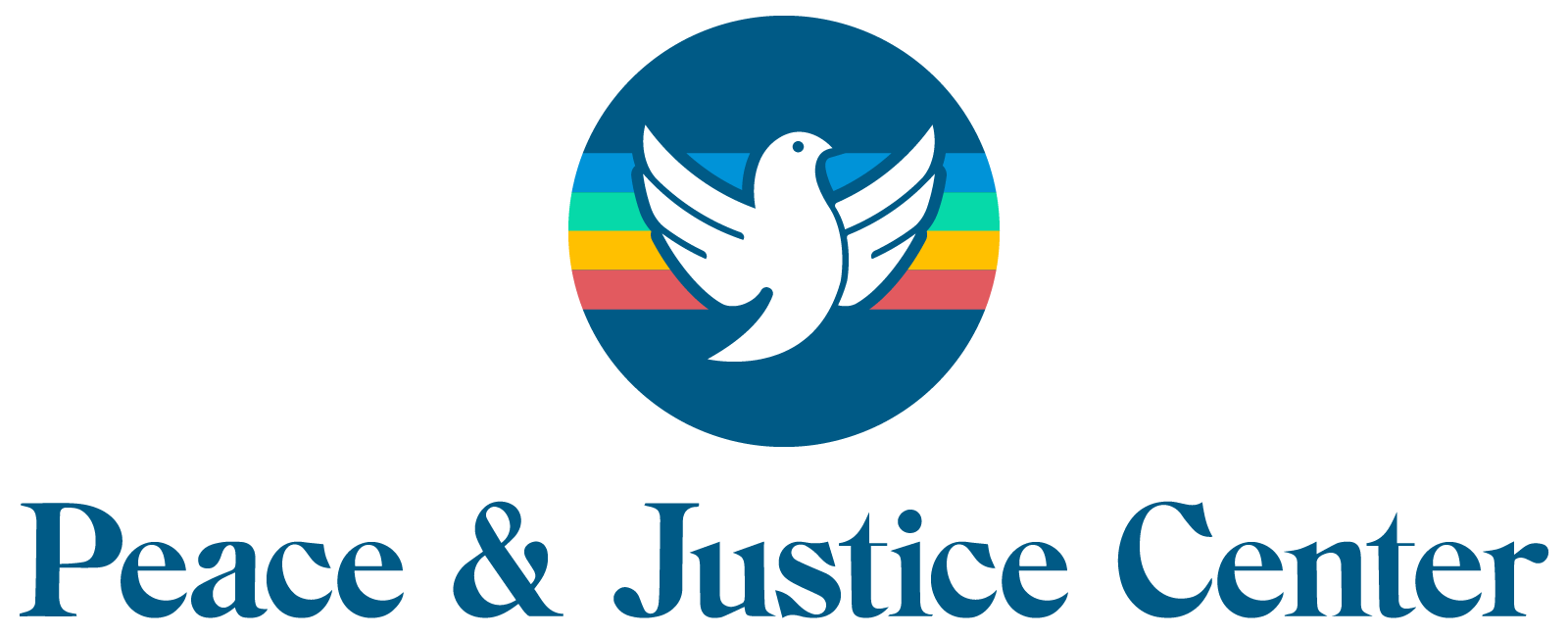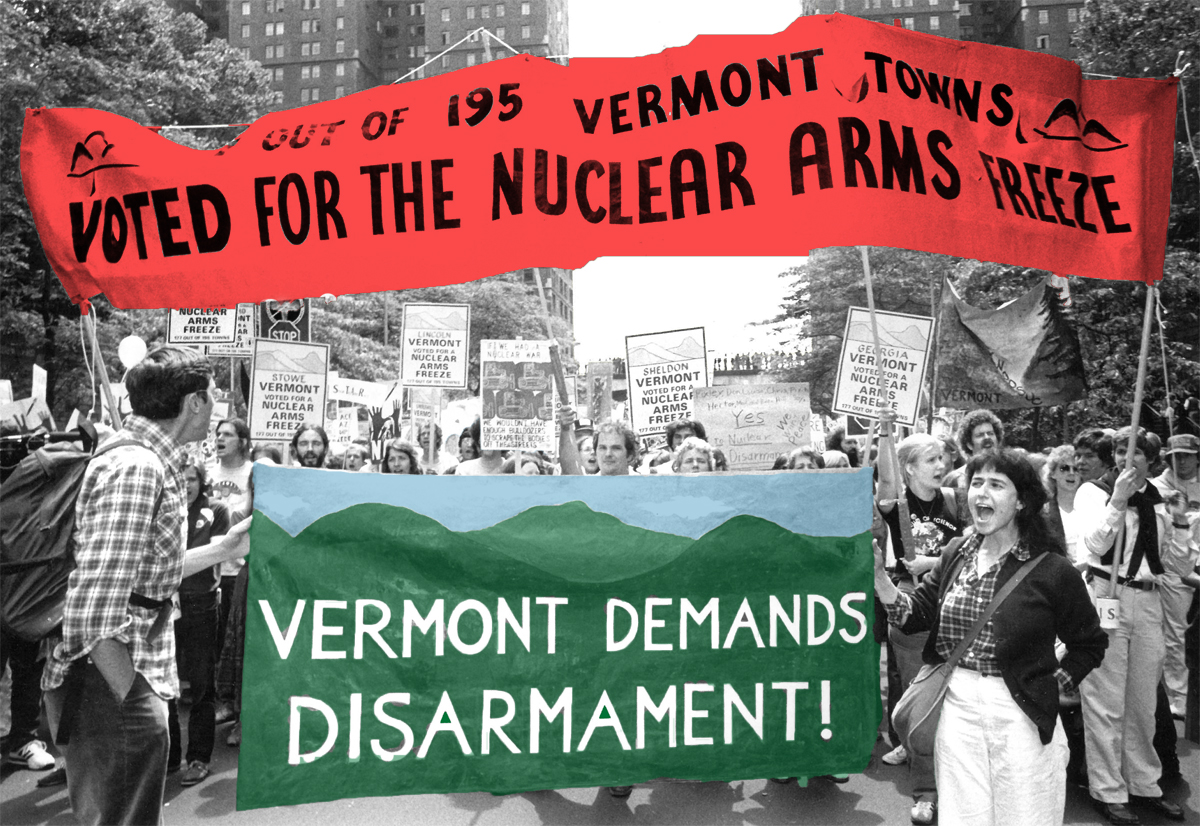– By Wendy Coe, PJC Founder & Gene Bergman, former Board Chair
Organizations as dynamic as the Peace & Justice Center activate many people, year after year. Quite often, people involved now know nothing of what happened before their time. History that relates the past to the present with an eye to the future can empower us with the hope, indeed the certainty, that we can meet whatever challenges arise.
January 29, 2019 will mark the 40th birthday of the PJC! Very few organizations dedicated to building a more just, peaceful, and equitable world, globally and locally, live to 40; even fewer have been as vital to the health of their home locality and state over their life as the PJC. Yet here we are.
On January 29, 1979, the world faced a nuclear arms race: deployment of “usable” neutron bombs (that destroy people but leave buildings), short range “tactical” nuclear weapons to be used on European battlefields, mega-missiles launched from hundreds to thousands of miles away with the force of thousands of Hiroshima bombs. We were on the brink of global annihilation.
In addition, Central America was on fire. Death squad-linked governments ‒ actively armed, trained, and funded by the US government ‒ terrorized their people in Guatemala and El Salvador. In Burlington itself, the General Electric plant on Lakeside Avenue produced Gatling guns that were used in El Salvador against people rising up against the repression. At the same time, US-funded Contras used Honduras as a base to attack Nicaragua. Seeds of the current refugee crisis at our southern border were planted and grown with support from our government.
As journalist Jonathan Schell wrote, “The Fate of the Earth” was in our hands. Thankfully, the PJC was a leader in the resistance against this insanity and violence.
As part of a Vermont-wide movement, we employed an innovative strategy focused on engaging people in the towns they live in and using a forum they have access to: Town Meeting. In 1981, 18 cities and towns voted for a Nuclear Weapons Freeze; in 1982, over 150 new towns followed suit. Town Meeting continues to be a place for Vermonters to engage on the most important issues of our time.
Popular education has always been a strategy we’ve used, knowing that to connect people and change minds, hearts, and policy, the stories of those affected as well as the facts of an issue must be widely shared. We provided educational materials to help people in their communities convince their neighbors to support a nuclear freeze. Our newsletter, critical during a pre-internet era, was regularly distributed monthly to over 1,000 people. Throughout the 1980s, thousands attended PJC events: forums of US House and Senate candidates on peace and national security issues; cultural exchanges with people from Russia, Japan, and Central America; and authors and experts on nuclear issues, the Central American wars, and even the economic conversion to peaceful uses of Burlington GE’s Gatling Gun plant. The Peace & Justice Store was opened in 1983, exposing even more people to the interconnection of global trade with militarism and all aspects of social, economic, and environmental justice.
Participation in national days of action has also been a strategy the PJC has used from its earliest days to amplify Vermonters’ voices and join us to wider movements. On June 12, 1982, nearly 2,000 Vermonters attended the No Nukes Rally in NYC with over 1 million people, the highest per capita state in attendance. The PJC coordinated Burlington’s six buses, six vans, and many car pools. Coordinating travel to national demonstrations continues to be a key role the PJC plays in the movement. We also held local rallies and marches at the same time as others were held throughout the nation, showing the breadth and strength of the coordinated movement for peace and justice.
Following the examples of Gandhi and MLK, another strategic focus from the beginning was involvement in, and support of, civil disobedience. This included the 1984 Winooski 44 sit-in that took
place in Senator Stafford’s office over US involvement in Central America and civil disobedience trainings and non-violent actions at the GE Firing Range in Underhill and its plant in Burlington.
Creative engagement, public education, participation in state and national actions, civil disobedience support work, and being a clearinghouse and hub for action and education throughout Vermont: these strategies have been central to the PJC’s success. But added to these has been a dynamic flexibility and adaptability with regard to issues and activities, all of which has allowed us to remain relevant.
The publication of the Vermont Grassroots Directory (in the 1990s) let people know who they could contact and how (again, pre-internet), reinforcing the PJC’s role as a vital center for movement work in Vermont. New issues were added to the Center’s focus on peace. A conference on Ecological Security was held in Burlington’s City Hall in 1989, attended by over 400 people, followed by a year-long campaign in support of the Cree of Quebec in their fight against the massive flooding of their lands by Hydro Quebec (HQ). Public education against the HQ project helped lead voters in Burlington to reject the purchase of HQ power in 1992.
In the 1990’s, the fight against racism was added as well, reflected in our Racial Justice & Equity Project which conducted scores of anti-racism trainings, reviewed anti-harassment policies in Chittenden County schools, and worked with the US Civil Rights Commission on racial harassment in Vermont schools. The PJC’s support of the Cree and the Abenaki of Vermont’s struggles to protect their heritage was also part of this anti-racism focus.
Fair trade and workers’ rights became a focus, through purchasing policy and educational activities of the Peace & Justice Store, and through the Vermont Job Gap Study and Livable Wage Campaign, which led to legislative successes and raises in Vermont’s minimum wage. To oppose the right wing Contract On America, during the 1995 National Governor’s Convention being held in Burlington, we provided crucial staff support, facilities, volunteer coordination, and resources that helped make the People’s Conference for Economic Democracy a huge success. Attended by over 2,500 people, the day was filled with speakers, a parade led by Bread & Puppet, voter registration, and music.
The PJC continues to be a leader in the movement for justice and against militarism in Vermont, engaging in the critical issues of our time with a dynamic, adaptive approach. Together with other groups and people throughout the state, we are helping Vermonters achieve shared prosperity and self-sufficiency, working to achieve a just and peaceful world by working on the interconnected issues of peace, human rights, and economic, social, and racial justice through education, advocacy, training, nonviolent activism, community organizing, and collaboration.
Thank you for being a part of our last 40 years, showing the power and impact that people can have when we join and act together for the common good.
PJC, continued…
By Rachel Siegel
Following the great recession of 2007-2009, the PJC almost folded. Membership had slowed, store sales dwindled, and grants dried up. During a community gathering in 2011, attendees committed to keeping the PJC afloat. There was no director for over two years. Staff and board tension was high. When I was hired five years ago, the organization was strained but was starting to regain its footing.
Together, we have improved our peace work with a truly intersectional lens, clarified and further developed the fair trade program and store, and developed new educational racial justice workshops. We have picked up on things that the organization has always stood for and built on them. Our Allied Group program has been useful for an increasing number of groups allowing us to share our infrastructure with newer and smaller projects. We are a clearinghouse and resource for many. We actively engage young people through our internships and volunteer opportunities ‒ people whose leadership and creativity enriches our work and who leave the PJC with tools and motivation to carry our mission with them far beyond our doors.
We have also done internal and structural work to clarify our policies and practices and improve our systems. We changed our by-laws so that we must maintain minimum 50% people of color on the board of directors. We have a paid Racial Justice Advisory Committee that meets quarterly. We have developed a cohort of facilitators around the state and continue to refine how we support those facilitators to enable them to continue to do the emotionally draining anti-oppression work they do. We created a purchasing policy, our own educational program catalog, and have restructured our bi-weekly enews which now goes to over 6,000 people. And, very important but perhaps less exciting, we got new computers, new phones, a new point of sale system, and a new data base.
Lots has changed in 40 years. We are grateful to those who came before and we are grateful to continue the mission to make a peaceful and just world. And we do so with you.

